-
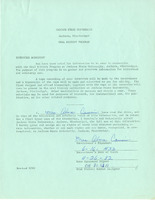 Alma Cousins interviewed by Cheryl Payne, Transcript.
Alma Cousins interviewed by Cheryl Payne, Transcript. Alma Cousins moved to the Farish Street District in 1953 and previously owned a restaurant in the neighborhood. Ms. Cousins recounts what the district was like back then compared to the present. She talks about businesses and restaurants in the district; the effects of White people moving into the area; and several Black lawyers in the district.
-
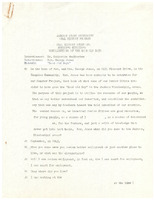 George Jones interviewed by Katherine Weatherbee, Transcript.
George Jones interviewed by Katherine Weatherbee, Transcript. Rev. George Jones moved to the Jackson area in 1945 to work as a college instructor. He discusses his first impressions of Jackson as an educator living on the Tougaloo campus while teaching home economics. He also talks about Sunday school, family, and the positive aspects and culture of the time. The transcript contains handwritten edits.
-
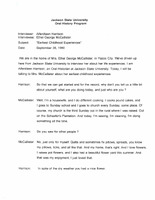 Ethel George McCallister interviewed by Alferdteen Harrison, Transcript.
Ethel George McCallister interviewed by Alferdteen Harrison, Transcript. Ethel George McCallister recalls many memories from her childhood, the plantation she lived and worked on, family, school, and her experiences in the church. She talks about her social life when she was young, and the relationships between the farmers, her marriage, and starting a family. She ends by talking about her family history.
-
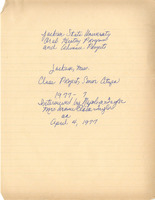 Aerl Cobbs interviewed by Napoleon Taylor, Transcript.
Aerl Cobbs interviewed by Napoleon Taylor, Transcript. Aerl Cobbs was born in 1900 and lived in Jackson, Mississippi, his whole life. Mr. Cobbs talks about his childhood and the games they played. He remembers some of the great educators in Jackson from his time in various schools in the city. The transcript is handwritten.
-
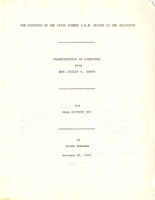 Rev. Phillip Brown interviewed by Linda Overman: "The Function of the Lynch Street C.M.E. Church in the Community," Transcript.
Rev. Phillip Brown interviewed by Linda Overman: "The Function of the Lynch Street C.M.E. Church in the Community," Transcript. Rev. Phillip Brown was a minister at Lynch Street C.M.E. Church from 1952-1953. The purpose of the interview was to learn about the function of the Lynch Street C.M.E. Church in the community. Rev. Brown talks about being a life-long member of the church since its inception. The transcript is edited with handwritten notes.
-
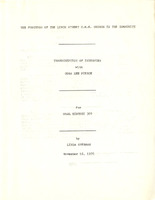 Cora Lee interviewed by Linda Overman: "The Function of the Lynch Street C.M.E. Church in the Community," Transcript.
Cora Lee interviewed by Linda Overman: "The Function of the Lynch Street C.M.E. Church in the Community," Transcript. Cora Lee was a native of Bentonia, Mississippi, and lived in Jackson for 49 years. The purpose of the interview was to learn about the function of the Lynch Street C.M.E. Church in the community. Ms. Lee talks about being a member of the church since 1927 and active at the church through its history. The transcript is edited with handwritten notes.
-
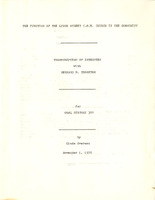 Bernard Thornton interviewed by Linda Overman: "The Function of the Lynch Street C.M.E. Church in the Community," Transcript.
Bernard Thornton interviewed by Linda Overman: "The Function of the Lynch Street C.M.E. Church in the Community," Transcript. Bernard Thornton was born in 1908 in Natchez, Mississippi. He lived 53 of his 68 years in Jackson, MS. The purpose of the interview was to learn information concerning the function of the Lynch Street C.M.E. Church in the community. Mr. Thornton talks about being a member of the church since 1925 and a trustee since 1945.
-
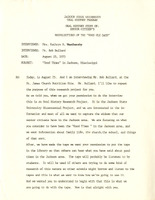 Bob Bullard interviewed by Kathryn Weathersby: "'Good Times' in Jackson, MS," Transcript.
Bob Bullard interviewed by Kathryn Weathersby: "'Good Times' in Jackson, MS," Transcript. Bob Bullard was born in Jackson, Mississippi, in 1905. Mr. Bullard discusses his earliest recollections of Jackson, Mississippi, forms of entertainment, church life, and school life. He recalls the “Good Old Days” as the days he attended Poindexter Junior High School and worked in his father’s brickyard.
-
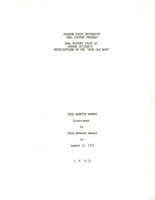 Annette Barnes interviewed by Deborah Denard, Transcript.
Annette Barnes interviewed by Deborah Denard, Transcript. Annette Barnes was born in 1905 in Mount Olive, Mississippi. Her family moved to Jackson in 1909 when her father opened Barnes Drug Store. She talks about her childhood in Jackson being fun but also with responsibilities. She recalls the “Good Old Days'' as the times she can look back on and times were not as hard as they were then thought to be.
-
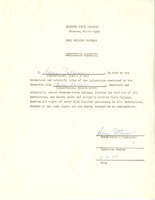 Minnie Wallace interviewed by Henry Patterson, Transcript/Audio.
Minnie Wallace interviewed by Henry Patterson, Transcript/Audio. Minnie Wallace was born in Winston County, Mississippi, in 1910 and moved with her preacher father to Yazoo City, Mississippi, in 1929. She talks about her childhood, saying it was difficult because the family worked as sharecroppers. She also discusses her education through graduating from Jackson State College in 1943. Transcript is handwritten.
-
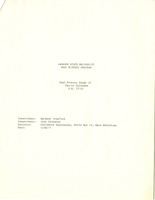 Earnest Crawford interviewed by Joel Converse, Biography, Summary, and Index.
Earnest Crawford interviewed by Joel Converse, Biography, Summary, and Index. Earnest Crawford moved to Jackson, Mississippi in 1940 to work for the Coca-Cola company and retired from there in 1965. Mr. Crawford talks about his experience sharecropping and his time spent as an airplane mechanic instructor during World War II. Included are biography, summary, and index only.
-
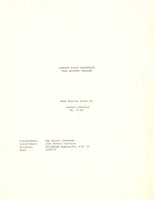 Ray Bozell Converse interviewed by Joel Robert Converse, Transcript.
Ray Bozell Converse interviewed by Joel Robert Converse, Transcript. Ray Bozell Converse was born in Isabel, Oklahoma, in 1912. His job with the Department of Agriculture brought him to Jackson in 1942 and 1955. He discusses opening a produce business and the effect of the Great Depression on his family. He also talks about living in Gulfport, Mississippi, during World War II. The transcript is incomplete.
-
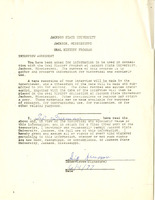 Sip Freeman interviewed by Dennis Caldwell, Transcript.
Sip Freeman interviewed by Dennis Caldwell, Transcript. Sip Freeman’s earliest memories were from when he was 8 years old. He talks about his childhood, his family and his church. He also talks about some experiences with White people and shares some stories about slavery that had been passed down through his family. The transcript is handwritten.
-
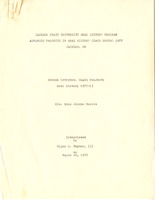 Edna Jordan Morris interviewed by Olger C. Twyner, Transcript.
Edna Jordan Morris interviewed by Olger C. Twyner, Transcript. Edna Jordan Morris was born in 1908 in Pachuta, Mississippi. She retired in 1973 after a 25 year teaching career. Ms. Morgan talks about her childhood and the games she played, her education, and church experiences. She also talks about her memories of encounters with White people. The transcript contains handwritten edits
-
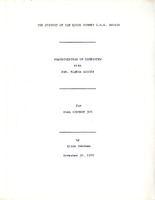 Elzena Harris interviewed by Linda Overman: "The History of the Lynch Street C.M.E. Church," Transcript.
Elzena Harris interviewed by Linda Overman: "The History of the Lynch Street C.M.E. Church," Transcript. Elzena Harris moved to the Jackson area in 1892 when she was 4 years old. She became a member of the Lynch Street C.M.E. Church in 1909 when it was organized. The purpose of this interview was to discuss the function of the church in the community. The transcript contains handwritten edits and is incomplete.
-
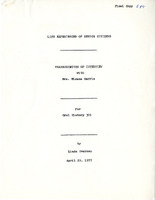 Elzena Harris interviewed by Linda Overman: "Life Experiences of Senior Citizens," Transcript.
Elzena Harris interviewed by Linda Overman: "Life Experiences of Senior Citizens," Transcript. Elzena Harris moved to the Jackson area in 1892 when she was 4 years old. She was the youngest of twelve children and she talks about her childhood, mentioning the games they would play. Ms. Harris also discusses her education from grade school through college at Jackson State. The transcript contains handwritten edits and is incomplete.
-
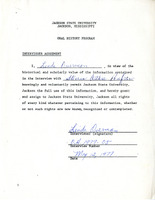 Stevens A. Renfrow interviewed by Linda Overman, Transcript.
Stevens A. Renfrow interviewed by Linda Overman, Transcript. Stevens A. Renfrow was born in 1892. He talks about the games he played as a kid and his education, including graduating from Mississippi State University in 1916. Mr. Renfrow also talks about his family and he recalls some of the types of food he and his family ate growing up. The transcript is edited heavily with handwritten notes.
-
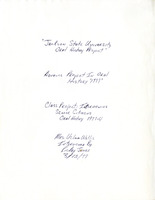 Velma Willis interviewed by Rickey Jones, Transcript/Audio.
Velma Willis interviewed by Rickey Jones, Transcript/Audio. Velma Willis was born in Newton County, Mississippi in 1903 and moved to Jackson in 1943. Ms. Willis talks about starting school in 1911 and finishing 8th grade and becoming a certified teacher for the next 35 years. She talks about her views on race relations in Newton County, one of the counties she taught in.
-
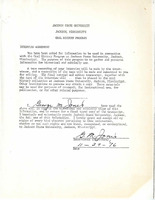 Rev. George Jones interviewed by Deborah Bernard and Dr. Catherine Weatherbee, Transcript.
Rev. George Jones interviewed by Deborah Bernard and Dr. Catherine Weatherbee, Transcript. Rev. George Jones was born in 1903 in Hermanville, Mississippi. He says the “Good Old Days” was the time about 40 years ago when he enjoyed baseball games and the fashions of the time. He talks about his education and his career as a teacher and principal, eventually moving to the Jackson area to teach. The transcript contains handwritten edits.
-
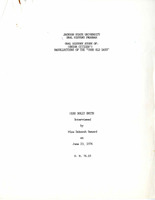 Dolly Smith interviewed by Deborah Denard, Transcript/Audio.
Dolly Smith interviewed by Deborah Denard, Transcript/Audio. Dolly Smith moved to Jackson with her family in 1919 or 1920 when she was a little girl. She says the “Good Old Days” were the times when things weren't as expensive. She reminisces on her childhood and what life was like during the Great Depression and talks about Black owned businesses, race relations, and music in Jackson.
-
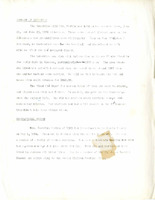 Beatrice Martin interviewed by Alferdteen Harrison, Transcript.
Beatrice Martin interviewed by Alferdteen Harrison, Transcript. Beatrice Martin was born in Rankin County, Mississippi, in 1904 and moved to Jackson two years later. For her, the "Good Old Days" were when she was younger and went to church and played games with her father. She discusses getting married in 1928 and purchasing some land and a home in a part of Jackson that had not yet been fully developed.
-
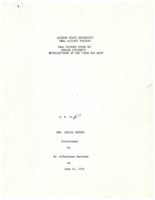 Ceolia Herman interviewed by Alferdteen Harrison, Transcript.
Ceolia Herman interviewed by Alferdteen Harrison, Transcript. Ceolia Herman was born in McGee, Mississippi in 1904 and came to Jackson in 1919 to go to high school while living with her sister until getting married and moving to Chicago. She moved back and worked as a nurse and then in a cleaners. She recalls the "Good Old Days" as days when she was younger and didn't have to worry about anything.
-
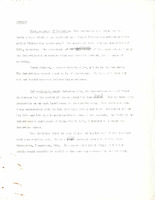 Brown Scott interviewed by Deborah Denard, Transcript.
Brown Scott interviewed by Deborah Denard, Transcript. Brown Scott was born in 1912 and came to Jackson in 1951. He recalls the "Good Old Days" as a comparison between the past and present: they were good in the sense that people enjoyed them at the time, but what is good now is quite different. He discusses racial issues he faced in Jackson and being in Europe in the Army for World War II.
-
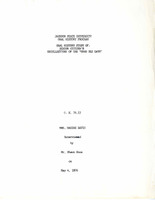 Maxine Davis interviewed by Shawn Knox, Transcript.
Maxine Davis interviewed by Shawn Knox, Transcript. Maxine Davis was born in Forrest, Mississippi, in 1907 and came to Jackson around 1934. She believes the “Good Old Days” are in the present because race relations are better now. She talks about experiencing the Civil Rights Movement. She remembers the use of coal and wood stoves, kerosene lamps, and people growing their food when she was younger.
-
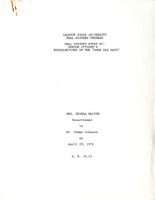 Serena Walton interviewed by Tommy Johnson, Transcript.
Serena Walton interviewed by Tommy Johnson, Transcript. Serena Walton was born in 1908 and moved to Jackson in 1937 after marriage. She recalls the “Good Old Days" as being days of fun, misery, and everyday existence during the 1930's through 1950's. Ms. Walton talks about her younger days and then her time at college during the Great Depression. She also discusses her time teaching in Yazoo County.
 Alma Cousins interviewed by Cheryl Payne, Transcript. Alma Cousins moved to the Farish Street District in 1953 and previously owned a restaurant in the neighborhood. Ms. Cousins recounts what the district was like back then compared to the present. She talks about businesses and restaurants in the district; the effects of White people moving into the area; and several Black lawyers in the district.
Alma Cousins interviewed by Cheryl Payne, Transcript. Alma Cousins moved to the Farish Street District in 1953 and previously owned a restaurant in the neighborhood. Ms. Cousins recounts what the district was like back then compared to the present. She talks about businesses and restaurants in the district; the effects of White people moving into the area; and several Black lawyers in the district. George Jones interviewed by Katherine Weatherbee, Transcript. Rev. George Jones moved to the Jackson area in 1945 to work as a college instructor. He discusses his first impressions of Jackson as an educator living on the Tougaloo campus while teaching home economics. He also talks about Sunday school, family, and the positive aspects and culture of the time. The transcript contains handwritten edits.
George Jones interviewed by Katherine Weatherbee, Transcript. Rev. George Jones moved to the Jackson area in 1945 to work as a college instructor. He discusses his first impressions of Jackson as an educator living on the Tougaloo campus while teaching home economics. He also talks about Sunday school, family, and the positive aspects and culture of the time. The transcript contains handwritten edits. Ethel George McCallister interviewed by Alferdteen Harrison, Transcript. Ethel George McCallister recalls many memories from her childhood, the plantation she lived and worked on, family, school, and her experiences in the church. She talks about her social life when she was young, and the relationships between the farmers, her marriage, and starting a family. She ends by talking about her family history.
Ethel George McCallister interviewed by Alferdteen Harrison, Transcript. Ethel George McCallister recalls many memories from her childhood, the plantation she lived and worked on, family, school, and her experiences in the church. She talks about her social life when she was young, and the relationships between the farmers, her marriage, and starting a family. She ends by talking about her family history. Aerl Cobbs interviewed by Napoleon Taylor, Transcript. Aerl Cobbs was born in 1900 and lived in Jackson, Mississippi, his whole life. Mr. Cobbs talks about his childhood and the games they played. He remembers some of the great educators in Jackson from his time in various schools in the city. The transcript is handwritten.
Aerl Cobbs interviewed by Napoleon Taylor, Transcript. Aerl Cobbs was born in 1900 and lived in Jackson, Mississippi, his whole life. Mr. Cobbs talks about his childhood and the games they played. He remembers some of the great educators in Jackson from his time in various schools in the city. The transcript is handwritten. Rev. Phillip Brown interviewed by Linda Overman: "The Function of the Lynch Street C.M.E. Church in the Community," Transcript. Rev. Phillip Brown was a minister at Lynch Street C.M.E. Church from 1952-1953. The purpose of the interview was to learn about the function of the Lynch Street C.M.E. Church in the community. Rev. Brown talks about being a life-long member of the church since its inception. The transcript is edited with handwritten notes.
Rev. Phillip Brown interviewed by Linda Overman: "The Function of the Lynch Street C.M.E. Church in the Community," Transcript. Rev. Phillip Brown was a minister at Lynch Street C.M.E. Church from 1952-1953. The purpose of the interview was to learn about the function of the Lynch Street C.M.E. Church in the community. Rev. Brown talks about being a life-long member of the church since its inception. The transcript is edited with handwritten notes. Cora Lee interviewed by Linda Overman: "The Function of the Lynch Street C.M.E. Church in the Community," Transcript. Cora Lee was a native of Bentonia, Mississippi, and lived in Jackson for 49 years. The purpose of the interview was to learn about the function of the Lynch Street C.M.E. Church in the community. Ms. Lee talks about being a member of the church since 1927 and active at the church through its history. The transcript is edited with handwritten notes.
Cora Lee interviewed by Linda Overman: "The Function of the Lynch Street C.M.E. Church in the Community," Transcript. Cora Lee was a native of Bentonia, Mississippi, and lived in Jackson for 49 years. The purpose of the interview was to learn about the function of the Lynch Street C.M.E. Church in the community. Ms. Lee talks about being a member of the church since 1927 and active at the church through its history. The transcript is edited with handwritten notes. Bernard Thornton interviewed by Linda Overman: "The Function of the Lynch Street C.M.E. Church in the Community," Transcript. Bernard Thornton was born in 1908 in Natchez, Mississippi. He lived 53 of his 68 years in Jackson, MS. The purpose of the interview was to learn information concerning the function of the Lynch Street C.M.E. Church in the community. Mr. Thornton talks about being a member of the church since 1925 and a trustee since 1945.
Bernard Thornton interviewed by Linda Overman: "The Function of the Lynch Street C.M.E. Church in the Community," Transcript. Bernard Thornton was born in 1908 in Natchez, Mississippi. He lived 53 of his 68 years in Jackson, MS. The purpose of the interview was to learn information concerning the function of the Lynch Street C.M.E. Church in the community. Mr. Thornton talks about being a member of the church since 1925 and a trustee since 1945. Bob Bullard interviewed by Kathryn Weathersby: "'Good Times' in Jackson, MS," Transcript. Bob Bullard was born in Jackson, Mississippi, in 1905. Mr. Bullard discusses his earliest recollections of Jackson, Mississippi, forms of entertainment, church life, and school life. He recalls the “Good Old Days” as the days he attended Poindexter Junior High School and worked in his father’s brickyard.
Bob Bullard interviewed by Kathryn Weathersby: "'Good Times' in Jackson, MS," Transcript. Bob Bullard was born in Jackson, Mississippi, in 1905. Mr. Bullard discusses his earliest recollections of Jackson, Mississippi, forms of entertainment, church life, and school life. He recalls the “Good Old Days” as the days he attended Poindexter Junior High School and worked in his father’s brickyard. Annette Barnes interviewed by Deborah Denard, Transcript. Annette Barnes was born in 1905 in Mount Olive, Mississippi. Her family moved to Jackson in 1909 when her father opened Barnes Drug Store. She talks about her childhood in Jackson being fun but also with responsibilities. She recalls the “Good Old Days'' as the times she can look back on and times were not as hard as they were then thought to be.
Annette Barnes interviewed by Deborah Denard, Transcript. Annette Barnes was born in 1905 in Mount Olive, Mississippi. Her family moved to Jackson in 1909 when her father opened Barnes Drug Store. She talks about her childhood in Jackson being fun but also with responsibilities. She recalls the “Good Old Days'' as the times she can look back on and times were not as hard as they were then thought to be. Minnie Wallace interviewed by Henry Patterson, Transcript/Audio. Minnie Wallace was born in Winston County, Mississippi, in 1910 and moved with her preacher father to Yazoo City, Mississippi, in 1929. She talks about her childhood, saying it was difficult because the family worked as sharecroppers. She also discusses her education through graduating from Jackson State College in 1943. Transcript is handwritten.
Minnie Wallace interviewed by Henry Patterson, Transcript/Audio. Minnie Wallace was born in Winston County, Mississippi, in 1910 and moved with her preacher father to Yazoo City, Mississippi, in 1929. She talks about her childhood, saying it was difficult because the family worked as sharecroppers. She also discusses her education through graduating from Jackson State College in 1943. Transcript is handwritten. Earnest Crawford interviewed by Joel Converse, Biography, Summary, and Index. Earnest Crawford moved to Jackson, Mississippi in 1940 to work for the Coca-Cola company and retired from there in 1965. Mr. Crawford talks about his experience sharecropping and his time spent as an airplane mechanic instructor during World War II. Included are biography, summary, and index only.
Earnest Crawford interviewed by Joel Converse, Biography, Summary, and Index. Earnest Crawford moved to Jackson, Mississippi in 1940 to work for the Coca-Cola company and retired from there in 1965. Mr. Crawford talks about his experience sharecropping and his time spent as an airplane mechanic instructor during World War II. Included are biography, summary, and index only. Ray Bozell Converse interviewed by Joel Robert Converse, Transcript. Ray Bozell Converse was born in Isabel, Oklahoma, in 1912. His job with the Department of Agriculture brought him to Jackson in 1942 and 1955. He discusses opening a produce business and the effect of the Great Depression on his family. He also talks about living in Gulfport, Mississippi, during World War II. The transcript is incomplete.
Ray Bozell Converse interviewed by Joel Robert Converse, Transcript. Ray Bozell Converse was born in Isabel, Oklahoma, in 1912. His job with the Department of Agriculture brought him to Jackson in 1942 and 1955. He discusses opening a produce business and the effect of the Great Depression on his family. He also talks about living in Gulfport, Mississippi, during World War II. The transcript is incomplete. Sip Freeman interviewed by Dennis Caldwell, Transcript. Sip Freeman’s earliest memories were from when he was 8 years old. He talks about his childhood, his family and his church. He also talks about some experiences with White people and shares some stories about slavery that had been passed down through his family. The transcript is handwritten.
Sip Freeman interviewed by Dennis Caldwell, Transcript. Sip Freeman’s earliest memories were from when he was 8 years old. He talks about his childhood, his family and his church. He also talks about some experiences with White people and shares some stories about slavery that had been passed down through his family. The transcript is handwritten. Edna Jordan Morris interviewed by Olger C. Twyner, Transcript. Edna Jordan Morris was born in 1908 in Pachuta, Mississippi. She retired in 1973 after a 25 year teaching career. Ms. Morgan talks about her childhood and the games she played, her education, and church experiences. She also talks about her memories of encounters with White people. The transcript contains handwritten edits
Edna Jordan Morris interviewed by Olger C. Twyner, Transcript. Edna Jordan Morris was born in 1908 in Pachuta, Mississippi. She retired in 1973 after a 25 year teaching career. Ms. Morgan talks about her childhood and the games she played, her education, and church experiences. She also talks about her memories of encounters with White people. The transcript contains handwritten edits Elzena Harris interviewed by Linda Overman: "The History of the Lynch Street C.M.E. Church," Transcript. Elzena Harris moved to the Jackson area in 1892 when she was 4 years old. She became a member of the Lynch Street C.M.E. Church in 1909 when it was organized. The purpose of this interview was to discuss the function of the church in the community. The transcript contains handwritten edits and is incomplete.
Elzena Harris interviewed by Linda Overman: "The History of the Lynch Street C.M.E. Church," Transcript. Elzena Harris moved to the Jackson area in 1892 when she was 4 years old. She became a member of the Lynch Street C.M.E. Church in 1909 when it was organized. The purpose of this interview was to discuss the function of the church in the community. The transcript contains handwritten edits and is incomplete. Elzena Harris interviewed by Linda Overman: "Life Experiences of Senior Citizens," Transcript. Elzena Harris moved to the Jackson area in 1892 when she was 4 years old. She was the youngest of twelve children and she talks about her childhood, mentioning the games they would play. Ms. Harris also discusses her education from grade school through college at Jackson State. The transcript contains handwritten edits and is incomplete.
Elzena Harris interviewed by Linda Overman: "Life Experiences of Senior Citizens," Transcript. Elzena Harris moved to the Jackson area in 1892 when she was 4 years old. She was the youngest of twelve children and she talks about her childhood, mentioning the games they would play. Ms. Harris also discusses her education from grade school through college at Jackson State. The transcript contains handwritten edits and is incomplete. Stevens A. Renfrow interviewed by Linda Overman, Transcript. Stevens A. Renfrow was born in 1892. He talks about the games he played as a kid and his education, including graduating from Mississippi State University in 1916. Mr. Renfrow also talks about his family and he recalls some of the types of food he and his family ate growing up. The transcript is edited heavily with handwritten notes.
Stevens A. Renfrow interviewed by Linda Overman, Transcript. Stevens A. Renfrow was born in 1892. He talks about the games he played as a kid and his education, including graduating from Mississippi State University in 1916. Mr. Renfrow also talks about his family and he recalls some of the types of food he and his family ate growing up. The transcript is edited heavily with handwritten notes. Velma Willis interviewed by Rickey Jones, Transcript/Audio. Velma Willis was born in Newton County, Mississippi in 1903 and moved to Jackson in 1943. Ms. Willis talks about starting school in 1911 and finishing 8th grade and becoming a certified teacher for the next 35 years. She talks about her views on race relations in Newton County, one of the counties she taught in.
Velma Willis interviewed by Rickey Jones, Transcript/Audio. Velma Willis was born in Newton County, Mississippi in 1903 and moved to Jackson in 1943. Ms. Willis talks about starting school in 1911 and finishing 8th grade and becoming a certified teacher for the next 35 years. She talks about her views on race relations in Newton County, one of the counties she taught in. Rev. George Jones interviewed by Deborah Bernard and Dr. Catherine Weatherbee, Transcript. Rev. George Jones was born in 1903 in Hermanville, Mississippi. He says the “Good Old Days” was the time about 40 years ago when he enjoyed baseball games and the fashions of the time. He talks about his education and his career as a teacher and principal, eventually moving to the Jackson area to teach. The transcript contains handwritten edits.
Rev. George Jones interviewed by Deborah Bernard and Dr. Catherine Weatherbee, Transcript. Rev. George Jones was born in 1903 in Hermanville, Mississippi. He says the “Good Old Days” was the time about 40 years ago when he enjoyed baseball games and the fashions of the time. He talks about his education and his career as a teacher and principal, eventually moving to the Jackson area to teach. The transcript contains handwritten edits. Dolly Smith interviewed by Deborah Denard, Transcript/Audio. Dolly Smith moved to Jackson with her family in 1919 or 1920 when she was a little girl. She says the “Good Old Days” were the times when things weren't as expensive. She reminisces on her childhood and what life was like during the Great Depression and talks about Black owned businesses, race relations, and music in Jackson.
Dolly Smith interviewed by Deborah Denard, Transcript/Audio. Dolly Smith moved to Jackson with her family in 1919 or 1920 when she was a little girl. She says the “Good Old Days” were the times when things weren't as expensive. She reminisces on her childhood and what life was like during the Great Depression and talks about Black owned businesses, race relations, and music in Jackson. Beatrice Martin interviewed by Alferdteen Harrison, Transcript. Beatrice Martin was born in Rankin County, Mississippi, in 1904 and moved to Jackson two years later. For her, the "Good Old Days" were when she was younger and went to church and played games with her father. She discusses getting married in 1928 and purchasing some land and a home in a part of Jackson that had not yet been fully developed.
Beatrice Martin interviewed by Alferdteen Harrison, Transcript. Beatrice Martin was born in Rankin County, Mississippi, in 1904 and moved to Jackson two years later. For her, the "Good Old Days" were when she was younger and went to church and played games with her father. She discusses getting married in 1928 and purchasing some land and a home in a part of Jackson that had not yet been fully developed. Ceolia Herman interviewed by Alferdteen Harrison, Transcript. Ceolia Herman was born in McGee, Mississippi in 1904 and came to Jackson in 1919 to go to high school while living with her sister until getting married and moving to Chicago. She moved back and worked as a nurse and then in a cleaners. She recalls the "Good Old Days" as days when she was younger and didn't have to worry about anything.
Ceolia Herman interviewed by Alferdteen Harrison, Transcript. Ceolia Herman was born in McGee, Mississippi in 1904 and came to Jackson in 1919 to go to high school while living with her sister until getting married and moving to Chicago. She moved back and worked as a nurse and then in a cleaners. She recalls the "Good Old Days" as days when she was younger and didn't have to worry about anything. Brown Scott interviewed by Deborah Denard, Transcript. Brown Scott was born in 1912 and came to Jackson in 1951. He recalls the "Good Old Days" as a comparison between the past and present: they were good in the sense that people enjoyed them at the time, but what is good now is quite different. He discusses racial issues he faced in Jackson and being in Europe in the Army for World War II.
Brown Scott interviewed by Deborah Denard, Transcript. Brown Scott was born in 1912 and came to Jackson in 1951. He recalls the "Good Old Days" as a comparison between the past and present: they were good in the sense that people enjoyed them at the time, but what is good now is quite different. He discusses racial issues he faced in Jackson and being in Europe in the Army for World War II. Maxine Davis interviewed by Shawn Knox, Transcript. Maxine Davis was born in Forrest, Mississippi, in 1907 and came to Jackson around 1934. She believes the “Good Old Days” are in the present because race relations are better now. She talks about experiencing the Civil Rights Movement. She remembers the use of coal and wood stoves, kerosene lamps, and people growing their food when she was younger.
Maxine Davis interviewed by Shawn Knox, Transcript. Maxine Davis was born in Forrest, Mississippi, in 1907 and came to Jackson around 1934. She believes the “Good Old Days” are in the present because race relations are better now. She talks about experiencing the Civil Rights Movement. She remembers the use of coal and wood stoves, kerosene lamps, and people growing their food when she was younger. Serena Walton interviewed by Tommy Johnson, Transcript. Serena Walton was born in 1908 and moved to Jackson in 1937 after marriage. She recalls the “Good Old Days" as being days of fun, misery, and everyday existence during the 1930's through 1950's. Ms. Walton talks about her younger days and then her time at college during the Great Depression. She also discusses her time teaching in Yazoo County.
Serena Walton interviewed by Tommy Johnson, Transcript. Serena Walton was born in 1908 and moved to Jackson in 1937 after marriage. She recalls the “Good Old Days" as being days of fun, misery, and everyday existence during the 1930's through 1950's. Ms. Walton talks about her younger days and then her time at college during the Great Depression. She also discusses her time teaching in Yazoo County.